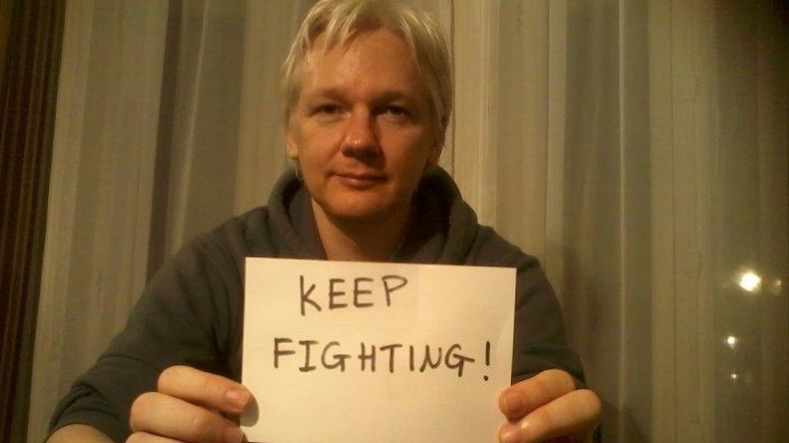UK court to hear Assange’s final appeal against extradition in February
Original article by Anish R M republished from peoples dispatch under a Creative Commons Attribution-ShareAlike 4.0 (CC BY-SA) license.

In the hearing, two judges will review an earlier decision to reject Assange’s appeal against his extradition to the US
The High Court of Justice in London has decided to hear what could be Julian Assange’s final appeal against his extradition to the United States. A statement released by Wikileaks on Tuesday, December 19, announced that the High Court has confirmed a two-day hearing on February 20-21, 2024.
The two-day hearing will be held before a bench of two judges and review the decision by Justice Jonathan Swift of the High Court to reject Assange’s plea against his extradition. In this last ditch attempt by Assange’s defense, the two judges will decide whether the Wikileaks founder will have any further chance to appeal his case in a British court or prepare for the looming extradition.
The 3-page long decision by Justice Swift handed down on June 6 this year, rejected all eight grounds of appeal raised by Assange’s defense team. The appeal, if approved by the High Court, will challenge the extradition sanctioned by the UK Home Office in June 17, 2022
Immediately after the court announced the dates, supporters and press freedom advocates called for a protest demonstration to be held outside the courthouse in London and in cities around the world, on the first day of the hearing.
John Rees of the Free Assange Campaign said in the Wikileaks statement that if the US is allowed to “get away with [their attempts to prosecute Assange], they will have succeeded in redefining journalism as spying.”
Stating that the extradition and a federal trial will have an impact on all journalists and broadcasters, Rees said that “every journalist will be intimidated. Every newspaper and journalist will look at material critical of the government and feel significant pressure not to publish for fear of prosecution and imprisonment.”
“This is the most important press freedom case of the 21st century and we need to ensure we don’t lose any hard-won freedoms.”
If extradited, Assange will stand trial before a federal grand jury in the US on 18 charges that carry a combined prison sentence of 175 years. Of the 18 charges leveled against him, 17 are under the infamous US Espionage Act.
Stella Assange, advocate and Julian’s wife, raised concerns of his safety and the nature of the looming trial in the event the US does succeed in his extradition. She, along with other members of Assange’s family and his colleagues, have been campaigning for his release ever since he was arrested in April 2019.
“With the myriad of evidence that has come to light since the original hearing in 2019, such as the violation of legal privilege and reports that senior US officials are involved in formulating assassination plots against my husband, there is no denying that a fair trial, let alone Julian’s safety on US soil, is an impossibility were he to be extradited,” she said. “The persecution of this innocent journalist and publisher must end.”
Read more: Julian Assange case: 4 things that the media doesn’t tell you
Kristinn Hrafnsson, editor-in-chief of Wikileaks, also echoed these concerns. “There is no press without the protection to operate freely,” Hrafnsson said. “Julian’s case is a landmark moment; the UK needs to decide if it wishes to be a haven for free press or if it wishes to be complicit in the degradation of a core value of our democracy.”
The US indictment against Assange, initiated under the Donald Trump administration and continued under President Joe Biden, is the first time ever a publisher has been charged under the Espionage Act.
In the meantime, Assange has remained imprisoned without charges since April 2019, in a high-security prison in Belmarsh on the outskirts of London, at the behest of the extradition request by the US.
His extradition was initially rejected by a district judge in London in January 2021 on grounds of Assange’s mental health and the risk of suicide and other bodily harm if he was extradited.
This decision was overturned by the High Court in London in December that year based on diplomatic assurances given by the US after the district court’s decision. In June 2022, the UK Home Office sanctioned the extradition based on the High Court’s decision.
US lawmakers call for Assange’s release
Even as the UK prepares for the court hearing in February, calls for Assange’s release have reached the US Congress.
A bipartisan resolution was introduced on December 16, in the US House of Representatives by Republican representative Paul Gosar, and co-sponsored by eight congress members seeking to drop all charges against Assange.
The draft resolution seeks to drop all charges against Assange and reinforce the fact that his journalistic activities, including the publication of classified government documents and diplomatic cables to expose US war crimes and other wrongdoings, were protected under the First Amendment rights of the US Constitution.
The resolution, co-sponsored by the likes of James McGovern, Thomas Massie, Marjorie Taylor Greene, and Ilhan Omar, also highlighted that the successful prosecution of Assange “would set a precedent allowing the United States to prosecute and imprison journalists for First Amendment protected activities, including the obtainment and publication of information, something that occurs on a regular basis.”
Similarly on November 14, another bipartisan group of members of Congress, led by McGovern and Massie, sent a letter to president Biden calling for the charges to be dropped. Aside from co-sponsors of the House draft resolution mentioned above, the signatories to the letter include the likes of Alexandria Ocasio-Cortez, Rashida Tlaib, Ayanna Presley, and Rand Paul.
Original article by Anish R M republished from peoples dispatch under a Creative Commons Attribution-ShareAlike 4.0 (CC BY-SA) license.





